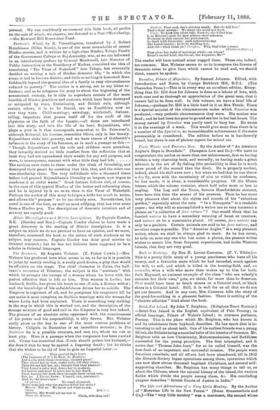The Sentence. By Augusta Webster. (T. Fisher Unwin.)—Mr. Webster has
produced here what seems to us, so far as it is possible to judge by merely reading it, a really good drama, a play that would be effective on the stage. The chief character is Caius, the half. lunatic successor of Tiberius ; the subject is the " sentence " with which he avenges the wrongs of a woman whom he loves with the purest affection that is left to him. This woman is Lmlia ; her husband, Stellio, has given his heart to one .4E mia, a Roman widow; and the knowledge of his unfaithfulness drives her to suicide. The Emperor is cognisant of all, and he postpones his vengeance till he can make it most complete, on Stellio's marriage with the woman for whom Lmlia had been neglected. There is something very striking in the way in which this is worked out, and the description of the strange mixture of good and evil in the Emperor is very fine indeed. The picture of an absolute ruler, oppressed with the consciousness of his power and his responsibility, is ably drawn. Mrs. Webster really gives us the key to one of the most curious problems of history. Caligula in Saetonius is an incredible monster ; in The Sentence he is a possible creature, and one, too, whom we can at least pity. Here is a passage when the vengeance has been carried out. Cresar has contrived that 2Eania should poison her husband,— she does it that he may be spared a lingering death ; but he thinks that she wishes to be rid of him to gain an Imperial lover :— Caius. They carried their loves
(The baseness of it !) to Bait% to Xenia's; And Delia with them—trusting, cheated guest! They closed her in slow, snaky coils, till they stung. They did not kill her, no; though that they planned : They found a safer way, drove her to madness. Set horror and grief to scare her to her death. Then, leaving her dead, they thought their secrek safe. But, no. I, Creser, knew. I heard, saw, sentenced And, lo, the lovers now !
(e pause.) Ye stand all scared. Dares none ask why the wanton killed her mate P Marcus. Tell us. We know not what to ask.
CUi1111.
Quintus. She would not answer it.
Caius (to /Eonia). Chick, wilt thou tell?
Ponteia. Poor soul, she's stricken numb. Bat she kill him.!
That's clear mistake. We know she could not do it.
Caius. To have him silent safe, Footei% sha killed him.
I, as Heaven's gods let men achieve their schemes, Dooming in that success her punishment, So dealt with these two each achieved to-day The hoped success ; he to be wedding her, And she—what think ye ? (laughs). Why, that's her success.
(Points to Stelito.) That gives her right of marriage whole—on whom? Rome's sacred head, the Caner, the Augustus, Me!"
The reader will have noticed some ragged lines. These are, indeed, too common. Mrs. Webster seems to us to transgress the licence of dramatic verse to give lines which cannot be read and, we should think, cannot be spoken.


































 Previous page
Previous page